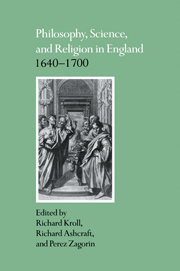Book contents
- Frontmatter
- Contents
- Notes on contributors
- Preface
- 1 Introduction
- Part I The Cambridge Platonists: philosophy at mid century
- Part II The Restoration settlement
- 7 Latitudinarianism and toleration: historical myth versus political history
- 8 The intellectual sources of Robert Boyle's philosophy of nature: Gassendi's voluntarism and Boyle's physico-theological project
- 9 Latitudinarianism and the “ideology” of the early Royal Society: Thomas Sprat's History of the Royal Society (1667) reconsidered
- 10 Locke and the latitude-men: ignorance as a ground of toleration
- 11 John Locke and latitudinarianism
- Index
7 - Latitudinarianism and toleration: historical myth versus political history
Published online by Cambridge University Press: 05 November 2011
- Frontmatter
- Contents
- Notes on contributors
- Preface
- 1 Introduction
- Part I The Cambridge Platonists: philosophy at mid century
- Part II The Restoration settlement
- 7 Latitudinarianism and toleration: historical myth versus political history
- 8 The intellectual sources of Robert Boyle's philosophy of nature: Gassendi's voluntarism and Boyle's physico-theological project
- 9 Latitudinarianism and the “ideology” of the early Royal Society: Thomas Sprat's History of the Royal Society (1667) reconsidered
- 10 Locke and the latitude-men: ignorance as a ground of toleration
- 11 John Locke and latitudinarianism
- Index
Summary
In this essay, I wish to discuss one of the problems which, en ensemble, constitute the grand controversy among historians, sociologists, and political theorists concerning the relationship between science, religion, economic change, and politics in seventeenth-century England, and the significance that relationship has for an understanding of the origins and meaning of Western capitalist society. The specific political problem to be considered is the toleration of dissent from the legally established Anglican Church, a problem with far more profound implications than might at first glance appear evident. Indeed, for seventeenth-century Englishmen, “the toleration controversy… called into question the whole structure of society.” That is, viewed in terms of a religious–political struggle between Anglicans and dissenters, the problem of toleration claims a structural significance for an understanding of social life in Restoration England.
From another standpoint, recently revived by a new generation of historians, the toleration of religious dissent was the outcome of the triumph of rationalism, the new experimental science, and the development of a latitudinarian perspective within Anglican theology during this period. According to this view, it is the historical tide of enlightenment–the power of ideas–rather than the tawdry clash of politically organized groups that provides the explanatory force in the historical account of the emergence of toleration.
Unfortunately, the passage of the Toleration Act of 1689 supplies virtually no empirical support for this viewpoint. While it is true that some details relating to this event are still shrouded in mystery, what is clear is that the passage of the Toleration Act cannot be explained in terms of the general acceptance by either the laity or the Anglican clergy of the reasonableness of toleration as a political policy.
- Type
- Chapter
- Information
- Philosophy, Science, and Religion in England 1640–1700 , pp. 151 - 177Publisher: Cambridge University PressPrint publication year: 1992
- 10
- Cited by

